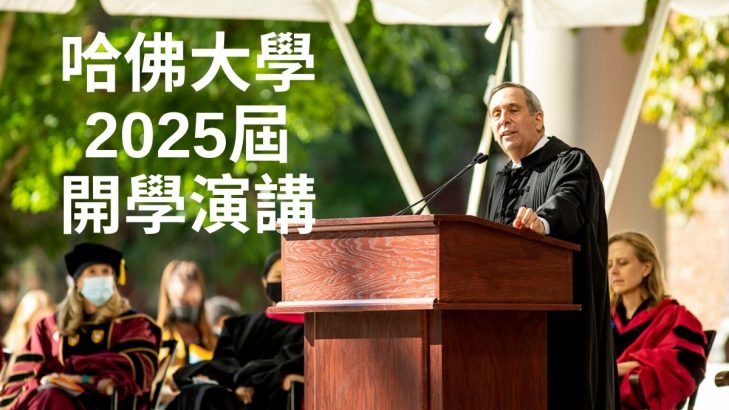前陣子哈佛大學開學時,校長 Larry Bacow 在當天上午和下午分別對 2024 與 2025 屆的學生發表兩場哈佛大學開學演講,這是繼 2019 年來校長與學生面對面進行談話。
以下我們要分享的是校長對 2025 屆學生的演講內容,有中英對照提供大家閱讀:
哈佛大學開學演講:2025 屆
下午好,2025 屆的學生們,很高興看到大家聚集在這裡,也很榮幸能正式歡迎你們成為哈佛大學社區的成員。
Good afternoon, Class of 2025. It is a pleasure to see all of you gathered in one place—and an honor to add my voice to the chorus welcoming you officially as members of the Harvard community.
在接下來的四年裡,你將訝異我們會經常碰面。我希望如果你看到我的時候,直接稱呼我 Larry 就好,因為大家都是這樣稱呼。我也希望你可以向我的妻子 Adele 打招呼,她會很高興認識你並聽你訴說這裡的大學生活。
You’ll be surprised by how often we run into one another over the next four years. I hope you will feel free to call me Larry—everyone does. And I hope you’ll also feel free to say hello to my wife, Adele—She is also excited to get to know you and to hear about your College experience.
到目前為止,大家過得如何?抱歉,可能沒有時間讓大家鼓掌一下,我真的太急著想知道大家過得如何了?
So how is it going so far? Sorry—maybe you haven’t clapped in a while—how is it going so far?
這樣好多了!請盡情感到快樂吧!是的,事情會變得更好,但是我們必須繼續在這裡慶祝可以在一起、健康快樂活著的一切好處。也請讓自己放鬆一下,好好感受這一刻,相信我,你到 50 年後都仍然會記得它。
That’s better! Please feel free to be elated! Yes, things could be better—a lot better—but we must continue to acknowledge and celebrate all that is good about being here, about being together, about being healthy, about being alive. Give yourself a break and savor this moment—you’ll remember it more than fifty years from now. Trust me.
生活曾經充滿歡樂,但 COVID-19 使我們必須花更多時間與自己相處、思考我們的行為、我們想要什麼,以及我們是誰。進入哈佛大學將進一步放大這些問題。因此我想在這裡分享我的想法,在未來的幾個星期、幾個月和幾年中,你將如何尋找生活的意義跟幸福。
Life used to be full of diversions, but the pandemic has forced all of us to spend more time with ourselves—more time thinking about how we behave, what we want, and who we are. Entering Harvard College will amplify those questions so I thought I would share my thoughts on how you might seek meaning and happiness in the weeks and months and years ahead.
關於「如何尋找生活中的意義與幸福」這個話題,相信有很多書,甚至 TikTok 上至少有十億個相關影片談論到它,但我讀過最好的建議是在一本古老的書籍 – 猶太傳統中的神聖文本《Talmud》。在《Ethics of Our Fathers》一卷中,Ben Zoma 提出了三個問題:誰是聰明的人?誰是強大的人?誰是富有的人?
There are a lot of books on the topic—and at least a billion TikToks—but the best advice I have ever read comes from an ancient source—the Talmud, a sacred text in the Jewish tradition. In the volume, Ethics of Our Fathers, Ben Zoma asks three questions for the ages: Who is wise? Who is mighty? Who is wealthy?
誰是聰明的人?Talmud 回答:「一個願意向任何人學習的人。」不論是在離你幾個座位,或相隔幾排坐著的人,他一定是位對事物看法與你完全不同的人,一個堅持與你觀點不一致且有信念的人。當你遇到那個人的時候,你第一時間可能是大聲且清楚的表明自己的觀點,試圖抵制對方。這時候請你先聽、詢問問題、多與對方對話,而不是抵制衝突。如果你因為對方觀點與你不同就離開,那麼你將無法利用哈佛最大的優勢 – 我們社區的多樣性和活力。永遠不要忘記:我們從差異中學習。
Who is wise? The Talmud answers, “The person who learns from all people.” A seat away from you—a row away from you—is someone who sees things very differently than you do, someone who holds fast to beliefs that are odds with your own. When you meet that someone—and you will—your first impulse may be to make your point, loudly and clearly. Try to resist that urge. Listen. Ask questions. Prompt conversation rather than conflict. If you leave this place with your backs to those who do not share your views, you will have failed to take advantage of one of Harvard’s greatest strengths—the diversity and dynamism of our community. Never forget: We learn from our differences.
誰是強大的人?Talmud 回答:「能夠自我控制的人。」接種疫苗不等於無敵,因為你每天接觸的人可能會回家或在其他地方與各種人接觸,你無法保證這些人也都是打過疫苗或是沒有確診的人。你的一些同學可能免疫功能不完整,或者是特別容易生病。當你處於新的環境時,請特別注意這些事情。今年成為社區一員的你們,有義務對他人的健康和安全負責任,也拜託大家好好照顧自己跟他人。
Who is mighty? The Talmud answers, “The person who exercises self-control.” Vaccination does not equal invincibility. The people you interact with daily may be returning home to family members who are not yet eligible to be vaccinated or who are at special risk of complications should they get the virus. Some of your classmates may be immunosuppressed or suffer from conditions that make them particularly vulnerable to this virus. Be mindful of them as you navigate your new home. Being part of this community—this year in particular—means bearing special responsibility for the health and safety of others. Please, please care for one another and for yourself.
誰是富有的人?Talmud 回答:「為自己感到高興的人。」有野心並沒有錯,但是為了野心而野心可能會產生反效果。在接下來的四年裡,我希望你們投入大量時間了解真正讓你滿意的東西是什麼。答案不是你的朋友、你的家人,也不是你的社區,而是你自己。要讓自己感到高興,你必須努力找到那樣東西,這樣的努力會讓你心情彭湃、讓你感到深深的滿足跟驚奇。相信我,全心全意投入對你而言很重要的事情會改變你的生活。而且,如果你像前幾代的哈佛人一樣,那麼你們當中有不少人會在這裡找到特別的東西。
Who is wealthy? The Talmud answers, “The person who rejoices in his or her portion.” There is nothing wrong with ambition, but ambition for ambition’s sake can be a distraction. Over the next four years, I hope you will devote luxurious amounts of your time to understanding what truly satisfies you. Not your friends. Not your family. Not your community. You. To rejoice in your portion, you must find your portion—the endeavor that swells your heart and fills you with a deep sense of satisfaction and wonder. Believe me when I tell you that devoting yourself to something that matters to you will change your life. And, if you are like generations of those who have come before you, many of you will find that special something during your time here.
上周末,我參加大學好朋友女兒的婚禮,50 年前我們在距離這裡約 150 步的 Emerson Hall 課堂上相遇,而我也是他婚禮上的伴郎。我對你們每個人的願望是,在接下來的四年裡遇到能成為你們一生最親密的好友,他們現在也在這裡,你的任務就是去找到他們。
This past weekend I gave a toast at the wedding of the daughter of one of my closest friends from college. We met fifty years ago—about 150 steps from here—in a class in Emerson Hall. I was best man at his wedding. My wish for each of you is that during the next four years you will meet classmates who will become your closest friends for life. They are here right now in this gathering. Your job is to go find them.
我很高興歡迎你們所有人來到哈佛,也很期待看到你們如何在《Talmud》定義的智慧、力量和財富上成長,以及你們如何在哈佛和今後生活帶你們去的任何地方尋求生活中的意義跟幸福。 同時,享受自己、玩得開心、結交朋友,並保持健康。 2025 級,祝你好運、一切順利!
I am thrilled to welcome all of you to Harvard and excited to see how you grow in wisdom, might, and wealth as the Talmud defines them—and how you choose to seek meaning and happiness both here at Harvard and wherever life takes you. In the meantime, enjoy yourselves, have fun, make friends, and please stay healthy. Class of 2025, good luck and godspeed.
